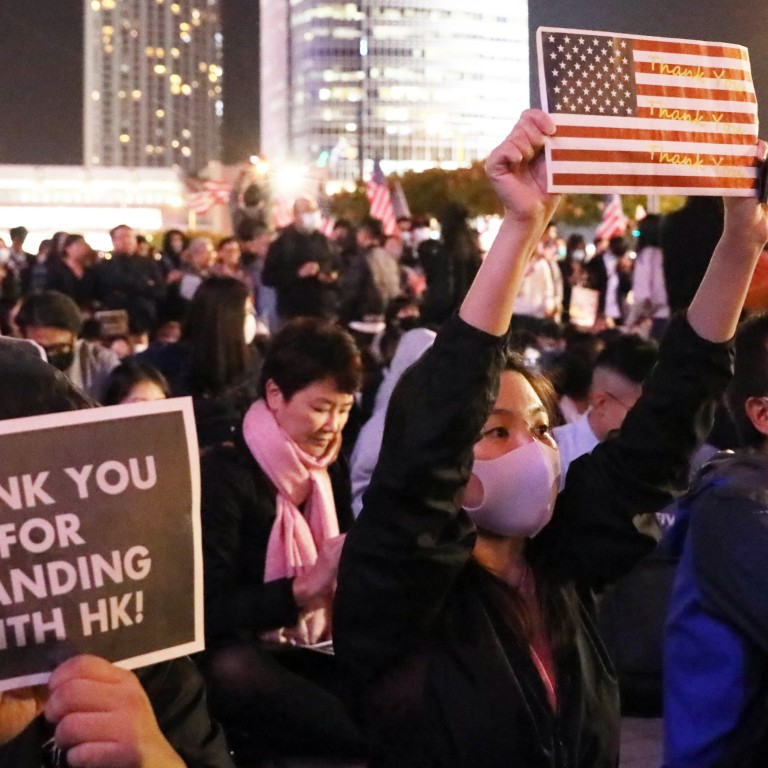
How big a deal is the Hong Kong Human Rights and Democracy Act for businesses?
- US President Trump signed the Hong Kong Human Rights and Democracy Act into law on November 27
- The legislation amends the US-Hong Kong Policy Act of 1992, under which Hong Kong enjoys special status that allows it to be treated as a separate entity from the rest of China in terms of customs, trade, investment, technology transfer and immigration
US President Trump signed the Hong Kong Human Rights and Democracy Act into law on November 27. The legislation amends the US-Hong Kong Policy Act of 1992, under which Hong Kong enjoys special status that allows it to be treated as a separate entity from the rest of China in terms of customs, trade, investment, technology transfer and immigration.
The bill requires an annual review by the US Secretary of State to certify whether Hong Kong remains “sufficiently autonomous” to justify the special treatment. It also opens the door to sanctions on officials deemed responsible for human rights abuses.
“Losing its special status would be a major setback for Hong Kong, removing its advantage in areas such as US customs clearance and access to sensitive US technology,” Standard Chartered said on November 29.
However, the new legislation does not mean an immediate or automatic revocation of the special status.
“We see a very low risk that it will be rescinded in the foreseeable future, as this would not be in the US’ best interest,” the bank said.
As regards any possible actions taken against Hong Kong’s special trade status, US business interests in Hong Kong will also suffer in the unlikely event of a downgrade in Hong Kong’s status, according to Jade Tang, a partner of law firm Oldham, Li & Nie.
Here is an explainer of how the bill could affect Hong Kong commercially even if the special status is revoked:
Q: What are the close and reciprocal bilateral relation between the US and Hong Kong?
- The US is Hong Kong’s second-largest merchandise trading partner in the world, while Hong Kong is the US’ 10th-largest export market.
- For the past 10 years, the US had enjoyed the largest trade surplus with Hong Kong among its many global trading partners, valued at US$33.8 billion in 2018 alone.
- There are 1,344 US companies registered in Hong Kong, of which 278 serve as regional corporate headquarters for the Asia-Pacific. Separately, around 85,000 US citizens live in Hong Kong, according to government statistics.
- Americans own nine of the 152 licensed banks, five out of the 18 restricted licence banks and one of 48 bank representative offices in Hong Kong at the end of 2018. US banks had about US$148 billion in assets and US$79 billion of customer deposits, about 5 per cent of Hong Kong’s banking industry.
- Ten of the 161 licensed insurers in Hong Kong are American. Another 12 are known to be controlled by US interests.
- Hong Kong was the third-largest market for US’ wine exports, the fourth-largest market for US’ beef exports
Q: How will the Hong Kong Human Rights and Democracy Act affect Hong Kong business if the city’s special status is revoked?
- Trade: Hong Kong’s domestic exports to the US only take up 0.1 per cent of the city’s total exports.
- Transshipment: Transshipment cargo does not depend on special tariff free access to the US market. Products transshipped through Hong Kong must still bear the mark of the country of origin, which means that products shipped from China through Hong Kong to the US must still pay applicable tariffs. As for direct cargo to and from Hong Kong, the act states that Hong Kong’s tariff free status would need to be reviewed every year. There would be an immediate impact to shipping business in Hong Kong, according to Roberto Giannetta, of the Hong Kong Liner Shipping Association.
- Personal investments: The most draconian provision of the law is the sanction which can be imposed on individuals considered to have knowingly violated basic human rights in Hong Kong, according to Tang of Oldham, Li & Nie. The sanction includes potentially freezing the US assets of the sanctioned persons, and revocation of existing visas and denial of new visas of the sanctioned persons and their family members.
- Given that these sanctions, if enforced, could most likely be imposed on politically exposed persons such as government officials as a symbolic support for social events in Hong Kong, local businessmen and corporations should be outside the sanction’s remit. The impact of these sanctions will therefore be minimal on businesses in Hong Kong, Tang said.
Q: What is the likely scenario?
The more likely scenario is that the annual review will become a recurring source of tension between the US and China.
The market appears to see the bill as another potential snag in US-China trade talks rather than a fundamentally damaging development for Hong Kong, according to Standard Chartered Bank.


